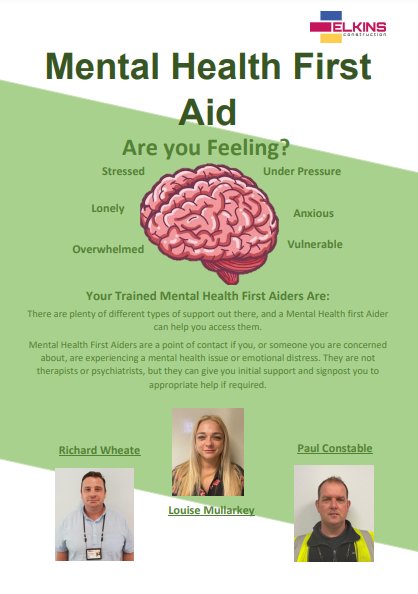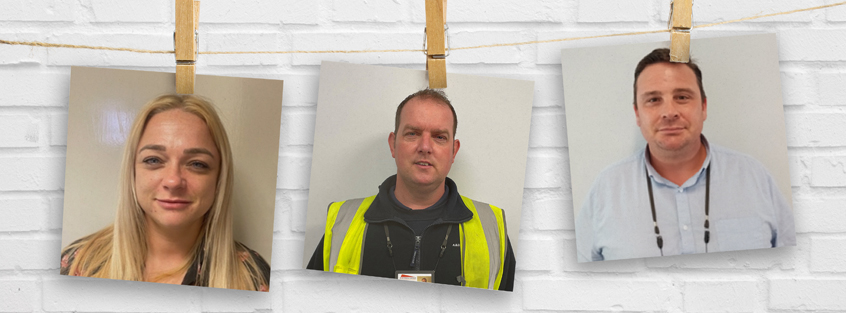Monday 9th May 2022 marks the start of Mental Health Awareness Week. We sat down with Elkins Construction’s Mental Health First Aiders – Louise Mullarkey, Richard Wheate, and Paul Constable – to discuss how Elkins supports staff’s mental health and the wider issues surrounding mental health in the construction industry.
How did you become a Mental Health First Aider?
Louise: I trained as a Mental Health First Aider in 2017. I’ve been a member of Elkins’ Mental Health First Aid team since 2020, which is when the company first introduced the scheme.
Paul: In contrast, I’m the newest member Elkins’ MHFA team! I was asked by the company if I was interested in undertaking the training as they were looking to get more men involved.
Richard: Louise, Paul and I are all very approachable people and have good established relationships with our colleagues, which is why we were suggested for the roles. Personally, I have experienced some difficult times in the past which have made me aware of the importance of looking after your mental health – it’s something I’m really passionate about.
What does being part of the MHFA team involve?
Richard: We’re here to offer a listening ear with no judgment if they want to have a friendly chat with a familiar face. While we can’t offer professional advice, we’re able to steer them in the right direction and put them in touch with the right people if they do need further help.
How have you found your experience as an MHFA in the business?
Louise: It can be quite a difficult role. In the past I’ve had to support people with a variety of mental health issues. It can be draining, and you have to make sure you protect your own mental health, but it is also rewarding to know that you’re helping people and getting them the support they need.
Richard: It is sometimes frustrating trying to get people to buy into the importance of mental health support. There is usually some initial resistance, because in the past people didn’t talk about how they were feeling, but thankfully this appears to be changing.
Paul: As I’m quite new to the role I haven’t had any significant incidents to manage. For me it’s really just been an extension of what I was doing before – listening to and supporting my colleagues. The only difference is I have the extra knowledge and training to back that up, so I’m able to offer additional support if someone needs it.
What should someone do if they’re experiencing mental health issues at work?
Paul: We have posters up and around our sites and the office with the phone numbers for mental health support and crisis lines for emergencies. If they feel comfortable, they can approach either Louise, Richard or myself as a first port of call as we can put them in touch with more specific support for what they’re struggling with.
What do you do to look after your own mental health and what advice would you give others?
Louise: For me, it’s really important to try and leave work at the door, and not carry the stresses and pressures home with you. This can be particularly difficult as a MHFA as you’re also dealing with other people’s mental health concerns, but you have to try and let it go.
Richard: It’s definitely important to talk. People need to know there’s no shame if you’re suffering with your mental health.
Paul: Many people are worried about speaking up for fear of the stigma. It’s especially a problem with men and those working in the construction industry. There’s no shame in looking after your physical health so there shouldn’t be any in looking after your mental health, it’s just as important!
We know people working in the construction industry are more likely to experience mental health issues. What changes do you think the industry could implement to help reduce stress and encourage people to seek help?
Richard: Increased awareness and funding of schemes to provide mental health support in the construction industry over the last few years have gone a long way. There’s more that could be done but things are definitely getting better.
Paul: We are seeing things start to change. Campaigns like Mental Health Awareness Week have made it more socially acceptable to talk about mental health and widely published statistics about the suicide rates in the construction industry means companies can no longer ignore the problems.
Louise: For many people suffering, just having someone to talk to honestly and openly can make a huge difference. At Elkins we’ve had Mental Health First Aiders for over two years and the company has always been passionate about supporting employees’ mental health. It’s not a requirement to have a MHFA team but it’s something that employees really appreciate and thankfully more companies seem to be realising this support needs to be in place.

Keep up to date with all our latest news here and follow us on social media: Twitter, Facebook, LinkedIn and Instagram


